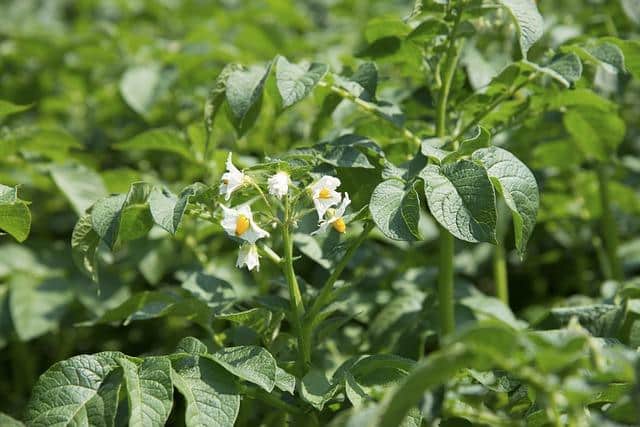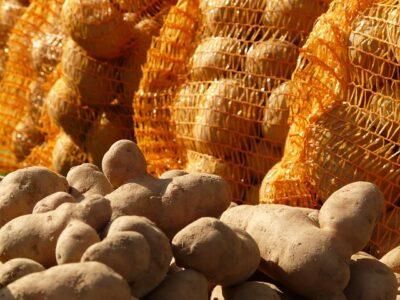The lowly potato. This dull tuber seldom ranks high on a list of superfoods. It won’t make headlines as the next “it” food. In fact, the most commonly known fact about potatoes is knowledge of the devastating Irish potato famine. Combine their blandness with recent diets that suggest eliminating carbohydrates is the silver bullet to weight loss, and the potato doesn’t stand a chance. Truth be told, potatoes may be the ultimate food source. Folks with a survival garden or looking to become self-sufficient should exploit their myriad of benefits.
Potatoes’ characteristics make them an ideal crop for self-sufficient gardens. For starters, potatoes grow well in a variety of soil types. Generally known for their success in sandy soils, potatoes also do well in other soils. The important thing to remember is to plant in any well-drained soil. Plant in waterlogged soil and you’re asking for problems with this root crop. Most productive garden plots have acceptable soil for potatoes.
The second major benefit of potatoes is they are possibly the easiest crop to save and replant. Anyone with experience in seed-saving will validate this statement. Other seeds must be separated from the fruit, cleansed of plant gunk, dried and then packaged for storage. Saving potatoes for seed is a much simpler process. Of course, you also can simply plant the potato itself to grow more potatoes. The ease of storing and growing potatoes is a huge benefit for someone in a survival situation. They simply save work.
Get The Best Deals On Non-GMO Seeds For Your Garden Right Here!
Finally, and this is essential, spuds are an absolutely excellent food source. Potatoes provide vitamins and minerals like potassium, fiber, B6, and vitamin C, just to name a few. The fact is potatoes are so nutritious you can live on them exclusively for months with no problems. Don’t believe it? In 1927, a study was performed by researchers at the school of hygiene in Poland to understand the benefits of potatoes. During the experiment two individuals, a man and woman both in their 20s, committed themselves to an all-potato diet for six months. Throughout the experiment the duo only ate potatoes for every single meal, although at some point they began cooking the potatoes in oil. Researchers realized the pair was burning more calories than they consumed and needed more energy. Fat from the oil added a bonus energy source but did not contribute any other nutritional value.
At the end of the six-month experiment, the pair were reported to be in great physical shape and fully nourished. Most shocking, the test subjects did not report any desire to add other foods to their diet. The study reported, “They did not tire of the uniform potato diet and there was no craving for change.” In their conclusion, the researchers summarized the study as “an experiment … in which two adults, a man and a woman, lived over a period of 167 days in nitrogen equilibrium and in good health on a diet in which the nitrogen was practically solely derived from the potato.”
In his book The New Self-Sufficient Gardener, John Seymour advises self-sufficient gardeners to invest heavily in potatoes. He advises planting potatoes in at least one-third of a garden. This is by far the largest proportion of any crop. In his rationale, he cites the nutritional value of potatoes and their outstanding ability to keep people alive.
This New All-Natural Fertilizer Doubles Garden Production!
History also displays the effectiveness of the potato. In South America, the Inca in the 1400s and 1500s were able to build the largest and most powerful nation in the Western Hemisphere using the potato as their staple crop. Upon the back of the lowly potato, they built thousands of miles of stone roads, conquered countless neighboring tribes, and constructed impressive temples. When you take into consideration the strenuous mountain lifestyle of these people, their potato-fueled exploits are that much more impressive.
For anyone serious about taking control of their food supply, the first step is to get your hands on some seed potatoes. Not all seed potatoes are created equal, and there is one major pitfall to avoid. Seed potatoes for a survival garden should always be certified disease-free. By investing in disease-free seed potatoes, you can help avoid a disaster like what befell the Irish. Obviously, this is important, especially for long-term survival.
All total, it is hard to deny the effectiveness of potatoes, especially in a survival garden. Their exceptional nutrition, combined with their ease of growth and storage, make them invaluable to someone who grows their own food. Not only are they promoted by some of the top self-sufficiency experts today, but the ultimate test of history proves their effectiveness as well. Whether it is potatoes for survival, or potatoes simply to take control of your food supply, it is hard to deny the power of the super spud.
What advice would you add for growing potatoes for survival? Share your thoughts in the section below:
Every Spring, Gardeners Make This Avoidable Mistake — But You Don’t Have To. Read More Here.
 Off The Grid News Better Ideas For Off The Grid Living
Off The Grid News Better Ideas For Off The Grid Living






